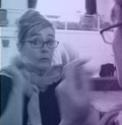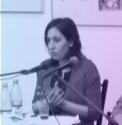Tata Traore Rogers: We need funds to be able to build a strong movement!

Reconstruction Women`s Fund keeps on spreading the voices of women who inspire and motivate us, within our programme of feminist philanthropy. We talked to our friend, colleague and a great activist Tata Traore – Rogers.
Tata has a rich activist experience in working with people both from margins and centre of social dynamics.
She is currently working as an executive director in the organization Turning Point and invests a lot of energy into providing basic living conditions for young girls living in the streets or having no home. We met Tata in New York at the meeting organized by Astrea foundation, where she also used to work as executive director. We are using this chance to congratulate Astrea foundation its dedicated work that lasts for 40 years already.
And now let’s hear what Tata has to say:
Why is it important to organize feminist festivals and gatherings?
While I don`t believe very much in communities being by themselves, because we need to cross borders, to exchange ideas, but I think it is very important for women to have their own spaces to be able to discuss issues that are relevant to them. To get to know themselves and be able to define themselves when they are in more general spaces, because usually we are lost, we get lost in male dominated society, our issues become secondary or they get diluted, and we need space where our issues are the primary issues to discuss, and because of that I think it`s very important to have those spaces that are ours. Eventually, with new generations that we have now, young people, young males who very much believe in feminism and understand what feminism is, it would be maybe interesting to sort of test incorporation of those who are open to our ideas and who are allies of ours, because you never want to just be among yourselves, you start talking to yourself, there is no new ideas that come in. In order to know how do we define ourselves and then go and share that with coherence, so people know exactly what we are trying to talk about and how we define ourselves and what we care about, so yes, I do think it`s extremely important to have those spaces now and to continue to have them and to explore how those spaces can be sort of open to more people if possible – we can do it and realize it`s not a good thing, and it`s good for us to keep them the way they are.
Do you think it`s important to invest money in women`s issues and women`s human rights?
It`s extremely important. I just returned, as you know, from Sri Lanka, where we had PROSPERA – international network of women`s funds meeting – where we had 124 people from all over the world to discuss many issues, and many issues were actually about money and our relationship with various sources of funds and how comfortable we are with that as activists, and sources of those funds sometimes come from actors we don’t necessarily agree with politically, so discussing ways to receive money and use it for our purposes and then be a little bit bolder, right, because sometimes we are so stuck in our own political views that it`s hard for us to go towards somebody who has different views, but sometimes we can use the money and our movement can benefit from it. We can educate whomever is giving us the money.
We talked about spaces, and we have to welcome different views and people in our spaces, and to do that we have to receive funds to build our work because in the West you and I can discuss this in America we can discuss it as well, openly, and it seems like given, while in many, many areas it`s not given, it`s a struggle that necessitates funds to be able to continue. If somebody is arrested or beaten or in jail because of their views, we sometimes need those funds, but sometimes you have to fund sort of fights for policy, everything needs funding, the staff who work in the movement need funding to be able to continue the work they are doing, but real funding, not sacrifice-funding, you know, to do everything for free because we are so used to that. So yes, we need funds to be able to build a strong movement and we need to explore other areas to get our funds and use them as means to communicate with groups that don`t know us very well and to educate and have more access to larger population so that our agenda is a little bit more spread out.
Do you knew about feminist foundations?
Yes, there are women`s funds all over the world, but that doesn`t mean that we have to stop. I think there need to be more. Some regions have sort of regional funds as opposed to countries, and I don’t think there will ever be enough. I think we need to continue to build those women`s funds, because I don`t see a society where men will just get up one day and say “Yes, we need to create spaces for women to talk about their issues”. We have to do it ourselves, and as such we need to have these funds, we need to have international funds that can fund local movements, because if your country is not supporting your agenda, you will never get funding, so it`s important to have funding organizations that fund all over the world, and we know many – PROSPERA itself sort of offers technical assistance, but you have many, many funds..We have Georgian fund which I love talking to about what they do with very little, not much funding, and then African Women`s Development Fund – it`s a big one, but you have smaller ones like Congolese Women`s Fund working in a war area. So it is not just important, it is crucial, it`s essential for us to have these foundations, and for people from all backgrounds to donate to them so that we can continue this work, because everybody has women, girls, daughters in their families, and look how long in the US they still never had a woman president, as you know, or in the US they are still very low on the scale of representation of women and you have very tiny countries that are being very innovative with very little money. So, yes, I think your question is an important one and it is very important for those funds to exist and to receive funding from other sources that might not necessarily have the same views but they can learn from us.
What is a concept of solidarity means to you?
Me being here, in Belgrade, with you, is a concept of solidarity, really, it`s not just friendship, it`s I think connecting to somebody from a different world form the world I grew up in, totally, completely different – and we meet and talk about issues that affect women, you in Belgrade, me in all of the places I lived in, and finding a common ground. Yesterday you took me to visit a wonderful artist TKV with whom I talked as if we knew each other for 10 years, you know, I didn`t want to leave, you had to drag me.
To me it`s not just connecting to a person on an individual level, but having a level of understanding, empathy, openness that you connect to issues that affect somebody, you are sitting in Africa somewhere and understand what is happening in Belgrade and you feel it, you support what`s happening there, even though it doesn`t affect you directly.
I am not lost in my world and issues that only affect my people on the local level, that if something happens to somebody in Iceland, in Belgrade, in Senegal, I feel it, I have the urge to react, to do something, to connect, and to contact them – that`s what I call solidarity, that it`s not limited to people who look like me and who act like me, but to somebody who`s totally different from me, who doesn`t have the same views, but I have empathy, understanding and a connection because they are human beings at the end of the day – so that matters to me, I don`t want to limit my solidarity to people who think and do things the same way that I do, I think that`s the easy version.
Thanks a lot.
Interview: Zoe Gudović
Transcription: Ana Imširović Đorđević





